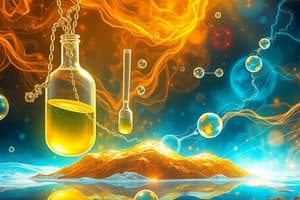Podcast
Questions and Answers
What is the unit of heat capacity?
What is the unit of heat capacity?
- g/°C
- J/g.°C
- J/°C (correct)
- J/mol.°C
What is the intensive property corresponding to heat capacity?
What is the intensive property corresponding to heat capacity?
- Molar heat capacity
- Specific heat capacity (correct)
- Adiabatic process
- Heat capacity ratio
What is the heat capacity ratio important for?
What is the heat capacity ratio important for?
- Electromagnetic processes
- Chemical reactions
- Thermodynamical reversible processes (correct)
- Thermodynamical irreversible processes
What is the formula to calculate specific heat capacity?
What is the formula to calculate specific heat capacity?
What is the unit of specific heat capacity?
What is the unit of specific heat capacity?
What is the molar heat capacity of an object?
What is the molar heat capacity of an object?
What is the unit of molar heat capacity?
What is the unit of molar heat capacity?
What type of process occurs without transferring heat or mass between the system and its environment?
What type of process occurs without transferring heat or mass between the system and its environment?
In an adiabatic process, what is transferred to the surroundings?
In an adiabatic process, what is transferred to the surroundings?
What is the change in heat in an adiabatic process?
What is the change in heat in an adiabatic process?
Types of equilibrium
Types of equilibrium
Flashcards are hidden until you start studying
Study Notes
Equilibrium and Types of Equilibrium
- Physical equilibrium is defined as the equilibrium that develops between different phases or physical properties, with no change in chemical composition.
- Types of equilibrium include:
- Phase Equilibrium: equilibrium between solid ice and liquid water, where the number of water molecules becoming ice is equal to the water molecules as ice melting to form liquid water.
- Solute-Solid Equilibrium: equilibrium between a solute in a saturated solution and an undissolved solute, where the number of molecules going out of the solution is equal to the number of molecules entering from the solid into the liquid.
- Gas-Liquid Equilibrium: equilibrium between the gas inside the liquid and the gas present above the liquid, where gases that do not react with liquid may dissolve directly related to the pressure in the liquid.
Heat, Work, and Energy
- The body's energy is used for operating its different organs, maintaining a constant body temperature, and doing external work.
- The Conservation of Energy Principle states that the change in stored energy in the body is equal to the heat lost from the body plus the work done.
- The first law of thermodynamics states that Δu = ΔQ - Δw, where Δu is the change in internal energy, ΔQ is the change in heat, and Δw is the work done.
Energy Changes in the Body
- Energy is a measure of a system's ability to do work, measured in Joules, and can be classified into two forms: potential energy and kinetic energy.
- The internal energy of a body is the summation of potential energy and kinetic energy.
- The change in internal energy in a chemical reaction is the difference in the internal energies of the products and the reactants.
Work and Power
- Work is defined as a force moved through a distance, where the force and distance are in the same direction.
- Power is the rate at which work is done, and is computed using the equation Power = Work / time.
Entropy and Enthalpy
- Enthalpy (H) is the sum of the internal energy and the product of its pressure and volume: H = E + PV.
- Change in Enthalpy (ΔH) is the difference in the enthalpies of the products and the reactants: ΔH = H(products) - H(reactants) = Hp - Hr.
- Entropy (S) is a measure of disorder or randomness in a system, and depends on temperature and external parameters such as volume.
Heat Capacity and Adiabatic Process
- Heat Capacity or thermal capacity is the amount of heat required to produce a unit change in temperature.
- Specific heat capacity (CS) is the heat capacity of an object divided by its mass, and is an intensive property.
- Molar heat capacity (CM) is the heat capacity of an object divided by the amount of substance in moles.
- Adiabatic Process is a type of thermodynamic process that occurs without transferring heat or mass between the thermodynamic system and its environment, where pressure, volume, and temperature change but ΔQ = 0.
Studying That Suits You
Use AI to generate personalized quizzes and flashcards to suit your learning preferences.




